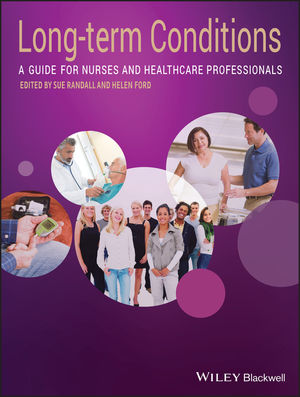Long-Term Conditions: A Guide for Nurses and Healthcare ProfessionalsISBN: 978-1-4443-3249-0
Paperback
344 pages
April 2011, Wiley-Blackwell
 |
||||||
Contributors xi
Introduction xv
Section 1 Living with a Long-Term Condition
1 Nutrition 3
Helen Ford
Introduction 3
Nutrition in context 3
What is nutrition? 7
Basics of nutrition 8
How much do we need to eat? 16
Assessing dietary intake 20
Assessing nutritional status 22
Nutrition problems in long-term conditions 23
Conclusion 45
References 45
Resources 48
Further reading 48
2 Chronic Pain: Living with Chronic Pain 49
Gay James
Introduction 49
Causes and pathology of pain 51
Types of chronic pain 53
Incidence of chronic non-malignant pain 56
Psychology and social considerations in chronic pain 58
The impact of pain 59
Chronic pain assessment 63
Interventions to manage chronic pain 70
Conclusion 88
References 89
Further reading 92
Organisations in the United Kingdom who may offer support 92
3 Depression and Long-term Conditions 93
Robert Tummey
Introduction 93
What is depression? 94
Recognition of depression as co-morbidity with long-term physical conditions 95
Prevalence of depression as co-morbidity with long-term physical conditions 99
Diagnosis of depression 101
Treatment for depression 104
Conclusion 114
References 115
Further reading 118
Section 2 Empowerment
4 Adaptation in Long-term Conditions: The Role of Stigma Particularly in Conditions that Affect Appearance 121
Andrew R Thompson
Introduction 121
LTC, Visible difference, disfigurement and body-image 122
Psychosocial, social and cultural impact of living with an LTC affecting appearance 123
Stigmatisation and LTCs 129
Psychosocial interventions 130
Conclusion 133
Acknowledgements 133
References 133
Resources 136
Further reading 136
5 Self-management in Long-term Conditions 138
Sue Randall and Andy Turner
Introduction 138
Context 138
Historical perspective 140
Self-care and self-management 141
Co-creating health initiative (CCH) 152
Underpinning theories 155
Conclusion 159
References 160
Resources 163
Further reading 163
6 Assistive Technology – A Means of Empowerment 164
Darren Awang and Gillian Ward
Introduction 164
Policy background 165
Defining key terms 167
Whole system demonstrators 179
Ethical issues 183
Workforce design, education and training 184
A technological future? 186
Conclusion 188
References 188
Resources 192
Further reading 192
7 Risk and Empowerment in Long-term Conditions 193
Annette Roebuck
Introduction 193
Risk in context – the bigger picture 194
Wider views of risk and empowerment 195
Empowerment 203
Conclusion 215
Acknowledgements 216
References 216
Further reading 218
Section 3 Care Management
8 Care Coordination for Effective Long-term Condition Management 221
Sue Randall
Introduction 221
Population contexts in England, Scotland, Wales and Northern Ireland in relation to LTCs 222
Care coordination 224
Frameworks of care delivery 233
Service delivery models 237
Other ways of working which influence care coordination 251
New ways of working 254
Conclusion 256
Acknowledgements 256
References 257
Resources 261
Further reading 262
9 Rehabilitation in Long-term Conditions 263
Bernie Davies and Jo Galloway
Introduction 263
Definitions and concepts of rehabilitation 263
The role of rehabilitation in the context of managing LTCs 265
Models and theories informing rehabilitation 268
Teams and teamwork in rehabilitation 275
The principles and process of rehabilitation for people with LTCs 280
Outcome measures and evaluation 286
Conclusion 290
References 290
Resources 293
Further reading 293
10 Palliative Care in Long-term Conditions: Pathways to Care 294
Claire Whittle and Jill Main
Introduction 294
What is palliative care? 294
What is end of life care? 297
Illness trajectories 297
Family and carers 299
Dying from LTCs 300
End of life symptoms and management of symptoms 304
Policies 305
Models of care 306
Spirituality 313
Conclusion 314
References 314
Resources 317
Further reading 317
Index 319



